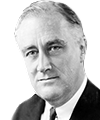Inauguration Of FDR
|
| updated |
Copy Link Code
|
- 1933 Inauguration: On Saturday, March 4, 1933, the first inauguration of Franklin D. Roosevelt took place on the East portico of the U. S. Capitol in Washington, D.C. He was sworn into office by Chief Justice Charles Evans Hughes as the 32nd President of the United States. FDR used his family Bible, published in 1686 and written in Dutch, which was opened to Corinthians 13, Saint Paul's instructions about love for one's fellow man. Roosevelt was the last U.S. president sworn in on March 4th per the 20th Amendment, which changed the presidential inauguration date to January 20th.
President Roosevelt's first inauguration occurred when American was mired deep in the Great Depression, thus his inaugural speech was one of encouragement, promise and responsibility. He pledged swift and determined action to prevent the people from slipping further into poverty, claiming that was the reason the people had elected him. The day after his inauguration, FDR declared a four-day bank holiday as his first step in leading the country out of the black hole of depression.
Instead of the pompous inaugural balls for any of FDR's inaugurations, charity balls were sponsored by private individuals for the elitist crowd, and the president held concerts for the public. For this first Franklin Roosevelt inauguration, Eleanor even cancelled a buffet luncheon she had scheduled at the White House out of respect for a senator who had died.
- 1937 Inauguration: The second Franklin D. Roosevelt inauguration was on January 20, 1937, the first to be held on this new date established by law. FDR was, again, sworn in by Chief Justice Charles Evans Hughes on the East portico of the capitol.
At this FDR inauguration, the president spoke of "We the Republic," symbolizing that the people were a community, that together the nation could face anything put before it. While Europe was anticipating war, Roosevelt's inaugural speech centered on domestic issues, the strong financial position of the federal government and his continuing pledge to help his fellow citizens.
To celebrate this second Franklin D. Roosevelt inauguration, the first couple hosted a buffet luncheon at the White House. The meager menu was sandwiches, cake and hot coffee.
- 1941 Inauguration: FDR's third inaugural was historic, because it was the first and last time in history that a U.S. president had been elected for a third term. Chief Justice Charles Evans Hughes administered the Oath of Office at Franklin Roosevelt's inauguration of 1941 on the East portico of the U.S. Capitol building. It was the first inauguration filmed in color, which was produced by the National Youth Administration, a product of Roosevelt's Works Progress Administration agency that employed citizens
At this Franklin Roosevelt inauguration, he spoke of the importance of democracy as Germany and Japan were spreading war across Europe. It was a rally for the U.S. to protect the freedom of all people. FDR's inaugural speech was a prelude to ending isolationism in the interest of global human rights, as he began to enlist support for America to join the Allied forces.
Following this historic inauguration, Franklin and Eleanor hosted a simple luncheon for twelve hundred guests at the White House.
- 1945 Inauguration: The inauguration of Franklin D. Roosevelt on January 20, 1945 was another historic event; it was the first time any president had been elected to a fourth term. FDR was sworn in by Chief Justice Harlan F. Stone in a simple ceremony held at the White House. There was no inaugural parade because of shortages in building materials and gas rationing. The world was immersed in World War II; the U. S. was in the juxtaposition of fighting alongside allied forces, while American factories churned out war supplies, an industrial opportunity that is credited for ending the Great Depression.
This time, Roosevelt's inaugural speech was futuristic; he spoke of world peace, of maintaining a position of world power for America and of sacrifice by those who fought for freedom and democracy. FDR reminded the people that the nation was supported by both "our allies and our God."
This final inauguration of FDR did not include any celebratory events following the modest swearing in of the president due to food rationing.
